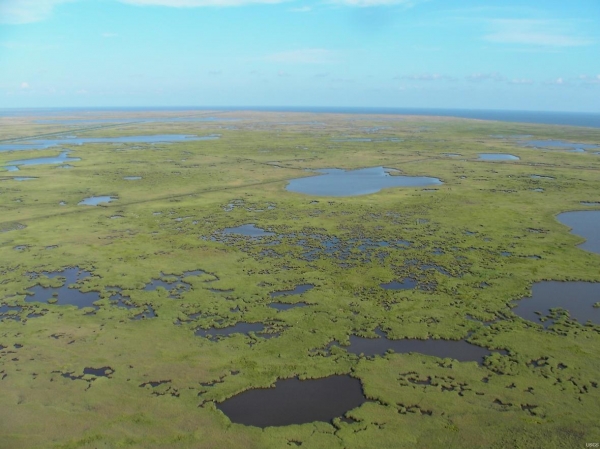A new study predicts that Mississippi Delta may drown for good

According to a new study, the marshes in the Mississippi Delta may permanently drown as a result of the global sea-level rise.
The Mississippi River is the second longest river in North America (following Missouri River) and stretches for around 1780 kilometers. In fact, for some, the Mississippi, Missouri and Ohio rivers can be considered as one system that is the 4th longest in the world after Nile, Amazon and Yangtze.
Mississippi River springs in Lake Itasca, a glacier lake in northern Minnesota, and flows into the Gulf of Mexico in Louisiana, running at a North-South direction.
The new study, recently published in Science Advances, suggests that remaining marshes of the Mississippi Delta in Louisiana are on the verge of submerging beneath the water level. According to the authors, while previous studies predict that the march area would survive even in the worst-case scenario of sea-level rise, the new evidence is far from optimistic.
In particular, the research shows that there is a critical point from which a slight change in the sea level would result in extensive flooding and submergence. “The scary thing is that the present-day rate of global sea-level rise, due to climate change, has already exceeded the initial tipping point for marsh drowning. And as things stand right now, the rate of sea-level rise will continue to accelerate and put us on track for marshes to disappear even faster in the future,” Dr. Torbjörn Törnqvist, lead author of the study and Vokes Geology Professor in the Tulane Department of Earth and Environmental Sciences in Tulane University, stated.
The total area of the wetlands in Louisiana is about 20000 square kilometers. 25% of that area is already lost over the past. The researches utilized data of sediment cores that were collected since the 1990s and evaluated the behavior of marshes in comparison to the seal-level rise over the past 8,500 years
The current model developed by scientists predicts that the submersion may occur within the next 50 years or within the next few centuries depending on the rate of the water-level rise. "...(previous) studies are mostly based on short-term records, uncertainty persists about the longer-term vulnerability of coastal marshes. We present an 8500-year-long marsh record from the Mississippi Delta, showing that at rates of RSL (Relative Sea-Level) rise exceeding 6 to 9 mm per year, marsh conversion into open water occurs in about 50 years," the study mentions.
So, what can be done to prevent or at least decelerate this disaster? According to Prof. Törnqvist, it is obvious that the attempts to reduce humanity's carbon footprint and halt climate change should be intensified. This would mitigate the polar ice melting and prevent sea-level rise. Apart from that, another solution would be to divert the course of the river so that some parts of the marshes would survive more. In both cases, it is certain that time is running out.
Source: Tulane University
Source: Tulane University
Media
- Effects of Sea-Level Rise on Coastal Wetlands in the Mississippi Delta
- USGS
Want to read more like this story?

New study finds above-limit quantities of PFAS “forever chemicals” in water globally
Apr, 08, 2024A new study, led by the University of New South W...

Ireland plans to build Europe’s first ammonia-fueled power plant
Dec, 21, 2023Two energy companies, Centrica and Mitsubishi Pow...

Japan inaugurates world’s largest nuclear fusion reactor
Dec, 01, 2023The world’s largest nuclear fusion reactor was in...

Processed spent coffee grounds can enhance concrete strength
Nov, 20, 2023Researchers at the Royal Melbourne Institute of T...

Potentially world’s largest known lithium deposit discovered in the US
Aug, 30, 2023A new study published on August 30, suggests that...

UN warns on the effects of sand dredging to the ocean floor and marine life
Sep, 05, 2023The UN Environment Programme (UNEP) warned on Tue...






